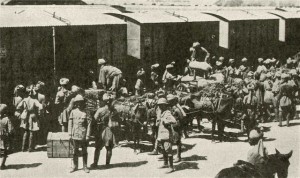Shared Sorrows: Indians and Armenians in the prison camps of Ras al-‘Ain, 1916-18 – 3
When Sisir Sarbadhikari volunteered for the Bengal Ambulance Corps, in 1915, he was in his early twenties and had just earned his Bachelor’s degree in law. Such was his eagerness to join the BAC that he actually pulled strings to get in: he would later attribute his enthusiasm to the ‘Spirit of Adventure’, of which he evidently had more than his fair share. Nor was he the only eager volunteer: some were so enthusiastic that they falsified their ages in order to enlist. One of them, Bhola, was only sixteen when he joined up – he would become a close friend of Sisir’s and he too would end up in the camps of Ras al-‘Ain.
The BAC was a small unit, with a total strength of 117, of which about a third consisted of ‘camp-followers’ – that is to say, cooks, sweepers, water-carriers and so on. It was led by five British officers and about a dozen Indian NCOs. The remaining sixty or so members of the unit were privates, of whom Sisir was one.
Although lowly in rank Sisir was from a family of well-educated middle-class professionals – a class that is often referred to in Bengal as ‘bhadralok’ or ‘gentlefolk’. Sisir himself was well-read in English as well as Bengali: his book is embellished with lines of English and Bengali poetry and he frequently refers to Xenophon and other figures from antiquity.
Many of the other volunteers seem to have been from circumstances similar to Sisir’s. They were not the kind of men who would have joined the regular army as privates, even if that had been a possibility. If the Ambulance Corps appealed to them it was probably because its medical associations lent it a touch of middle-class respectability.
The BAC volunteers were given three months training before being sent off to Bombay to join the 6th Poona Division which was on its way to Mesopotamia under the command of Major General Charles Townshed.

They left Bombay on a hospital ship, the Madras, on July 2, 1915, and reached Basra a week later. From then on, they accompanied the 6th army as it advanced steadily northwards, towards Baghdad.
